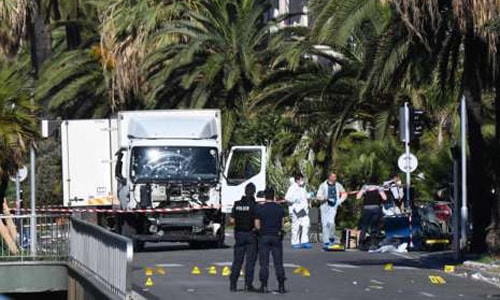France truck massacre could be IS's death blow
The form of terrorist attack using trucks has been outlined by IS militants and applied more and more in recent terrorist attacks.
 |
| The bullet-riddled truck used in the attack in Nice. Photo: AFP |
Although the self-proclaimed Islamic State (IS) has not yet claimed responsibility for the truck attack on the Bastille Day crowd in Nice on July 14 that killed at least 84 people, analysts say the incident has all the elements of a terrorist attack carried out by IS in a desperate situation.
The attack comes as IS struggles to make progress in Iraq and Syria. The territory controlled by the militants is shrinking more than ever, with several strategic cities falling into the hands of the militants in recent months. In Iraq, government forces are encircling the militant stronghold of Mosul. In Syria, the militant stronghold of Raqqa is under threat from multiple directions, according to the Huffington Post.
IS also recently confirmed that Omar al-Shishani, the organization's "minister of war", the man known as the red-bearded leader, was killed months ago in a US-led airstrike in Syria.
Suffering consecutive defeats, IS has called on its supporters abroad to organize attacks in all forms to retaliate against the West, including France, which has actively supported the US-led campaign to destroy IS.
In fact, France has experienced several failed terrorist attacks in recent months. Last August, two American soldiers saved France from disaster when they promptly subdued a gunman who boarded a train with the intention of carrying out a shooting. In January, French police shot dead a knife-wielding man on the first anniversary of the Charlie Hebdo attack. They found an IS flag on his person.
According to Professor John A. Tures of LaGrange University, the latest truck attack in Nice has all the hallmarks of an IS terrorist plot. It is very similar to the plan of Abu Musab al-Zarqawi, who wanted to use a series of trucks to drive straight into the US embassy in Jordan and then detonate them. In recent terrorist attacks in Baghdad, IS has also increased its use of truck bombs.
Therefore, Mr. Tures sees some connection between IS and this massacre, even if the attacker was just a “lone wolf” who pledged allegiance to IS. Like the bombing at Turkey’s Istanbul airport or the shooting in Orlando, the car crash was intended to show the world that IS is still as strong as ever.
This professor believes that this is the "death blow" of IS, when the rebels are gradually losing members, money, controlled areas, leaders, and are only a shadow of the richest terrorist organization in the world two years ago. Recently, IS had to announce to its members that the caliphate (Islamic kingdom) that the group has worked so hard to build will not last long, according to the Washington Post.
According to Mr. Tures, facing such desperate hysteria of IS, the US and the West must make appropriate choices for their policies both domestically and internationally.
If leaders succumb to overwhelming pressure from voters increasingly concerned about their safety and overreact or pursue domestic policies that discriminate against Muslims, they will continue to push more Westerners into radicalization and IS.
Tures said the anti-IS coalition in the Middle East will have to continue to build on its success in quietly disintegrating the militant network with precision airstrikes, working closely with allies and partners on the ground to retake territory. "How we respond will determine the success of the counterterrorism campaign," he stressed.
 |
| The road of death claimed the lives of more than 80 people on France's National Day. Graphics: NYTimes |
According to VNE
| RELATED NEWS |
|---|





.jpg)


